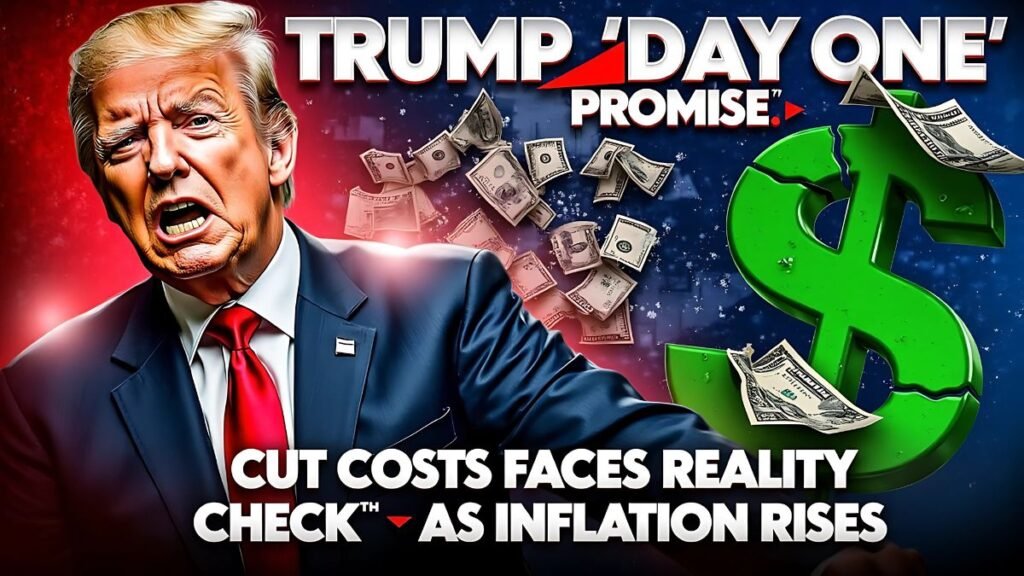Donald Trump had promised during his election campaign that he would reduce the expenses of American families on the very first day of assuming the presidency. But the latest economic data is telling a different story. The prices of essential goods and services are constantly rising, which has increased the concern among the general public and economists.
Rising inflation: Will Trump be able to keep his promise?
The Trump administration adopted various measures to control inflation and reduce costs, but the results were contrary to expectations. The inflation rate in the US has reached 3%, which is contrary to his election promise. Apart from this, policies such as tax cuts and deregulation may benefit some businesses but have failed to bring down prices for consumers.
Conflict of economic policies: Trump vs. Federal Reserve
Differences are emerging between the Trump administration and the Federal Reserve to control inflation. Trump is demanding low interest rates to boost economic activity, but Federal Reserve Chairman Jerome Powell is hesitant to cut interest rates due to inflation concerns.
Effect of tariff policies: Direct impact on the pockets of common consumers
The Trump administration imposed heavy import duties on countries like China, Canada and Mexico, with the aim of protecting American industries and reducing the trade deficit. But the result of this move was that imported goods became expensive and consumers had to pay a higher price.
Main effects of tariffs:
- Higher consumer prices – everyday items, such as electronics and vehicles, have become expensive.
- Impact on global trade – American companies have faced increased competition from China and European markets instead of other countries.
- Economic uncertainty – There is increased confusion among traders and investors, which leads to instability in the market.
Uncertainty in the economy: Impact on small businesses and workers
The trade and immigration policies of the Trump administration continue to affect businesses and workers. Businesses are affected by tariff duties and the ongoing labor shortage.
- Effects of immigration policies – A fall in the number of migrant workers has led to a dearth of workers in agriculture, construction and services that increases the cost of production.
- Cuts in government jobs – The unemployment rate will see some effect because of the lack of jobs in government departments.
- Deregulation – Some businesses may benefit, yet the relaxing of environmental and labor laws entails long-term damage.
Trump’s strategy and the future of inflation
The Trump administration is pursuing a plan to control inflation through a mix of lower interest rates and reduced government spending. The Department of Government Efficiency, under Elon Musk, proposes to cut federal spending, although that could also increase the chances of heading into a recession.
If high inflation continues side by side with increased import duties, it may harm the health of the American economy.
Practical advice for consumers
If you want to avoid rising inflation, here are some steps you can take:
- Make a budget – Review your household income and expenditure and cut down on non-essential expenses.
- Find alternatives – Instead of expensive brands, go for cheaper and high-quality options.
- Focus on investments- long-term investment plans are better for insulation against the threat of inflation.
- Be aware of what policies are being shaped by the government– stay in the know about the government’s economic policies and take time to reach out to the local representative.
- Use tax-saving campaigns that help to lessen tax liabilities.
Conclusion: Will Trump be able to deliver on his promises?
Donald Trump’s promise of “day one” is not coming to fruition. Inflation is surging, tariffs are hitting the pockets of the common man, and the uncertainty of economic growth remains. Some businesses may profit, but these profits don’t seem to reach the average American citizen at the moment.
If the administration really wants to control inflation, it will have to formulate a solid strategy, which also includes protecting consumer interests. Unless the right economic policies are implemented, the effect of inflation will continue, and this election promise of Trump may remain unfulfilled.
FAQs
Q. What was Trump’s promise about lowering costs?
A. Trump pledged to reduce costs for American families starting on “Day One” of his presidency.
Q. Has inflation increased since Trump’s election?
A. Yes, inflation has risen to 3% since the November election, contradicting his promise to lower costs.
Q. How have Trump’s tariff policies affected prices?
A. Tariffs on China, Canada, and Mexico have increased costs for imported goods, leading to higher consumer prices.
Q. Why is there tension between Trump and the Federal Reserve?
A. Trump wants lower interest rates to boost the economy, but the Federal Reserve is cautious due to inflation concerns.
Q. What can consumers do to manage rising costs?
A. Consumers can budget wisely, seek affordable alternatives, stay informed about policies, and explore tax-saving options.


